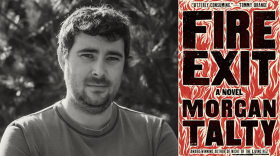This week on The Write Question, in the first of a two-part conversation, host Lauren Korn speaks with Vancouver, Canada-based journalist John Vaillant, author of Fire Weather: A True Story From a Hotter World (Alfred A. Knopf).
You can listen to the second part of their conversation here.
Fire has been a partner in our evolution for hundreds of millennia, shaping culture, civilization, and, very likely, our brains. Fire has enabled us to cook our food, defend and heat our homes, and power the machines that drive our titanic economy. Yet this volatile energy source has always threatened to elude our control, and in our new age of intensifying climate change, we are seeing its destructive power unleashed in previously unimaginable ways.
In May 2016, Fort McMurray, the hub of Canada’s oil industry and America’s biggest foreign supplier, was overrun by wildfire. The multi-billion-dollar disaster melted vehicles, turned entire neighborhoods into firebombs, and drove 88,000 people from their homes in a single afternoon. In Fire Weather, Vaillant warns that the devastation of “Fort Mac” was not a unique event; it was a shocking preview of what we must prepare for in a hotter, more flammable world.
About John:
John Vaillant’s acclaimed, award-winning nonfiction books, The Golden Spruce (W. W. Norton & Company) and The Tiger: A True Story of Vengeance and Survival (Vintage Books), were national bestsellers. His debut novel, The Jaguar’s Children (Mariner Books), was a finalist for the Rogers Writers’ Trust Fiction Prize and the International Dublin Literary Award. Vaillant has received the Governor General’s Literary Award, British Columbia’s National Award for Canadian Non-Fiction, the Windham-Campbell Literature Prize, and the Pearson Writers’ Trust Prize for Nonfiction. He has written for, among others, The New Yorker, The Atlantic, National Geographic, and The Walrus. He lives in Vancouver.
John Vaillant recommends:
The writing of David Wallace Wells in The New York Times
Underland: A Deep Time Journey by Robert MacFarlane (W. W. Norton & Company)
Ceremony by Leslie Marmon Silko (Penguin Random House)
Lauren Korn recommends:
Fire Weather: A True Story From a Hotter World (Alfred A. Knopf) and The Tiger: A True Story of Vengeance and Survival (Vintage Books) by John Vaillant
This is Wildfire: How to Protect Yourself, Your Home, and Your Community in the Age of Heat by Nick Mott and Justin Angle (Bloomsbury Publishing)
The Big Burn: Teddy Roosevelt and the Fire That Saved America by Timothy Egan (Mariner Books)
Higgins Ridge, a documentary about the smokejumpers who pivoted from battling a fire to fighting for their lives on August 4, 1961 (Montana PBS)
Land on Fire: The New Reality of Wildfire in the West by Gary Ferguson (Timber Press)
On Fire: The (Burning) Case for a Green New Deal by Naomi Klein (Simon & Schuster)
Shadows on the Klamath: A Woman in the Woods by Louise Wagenknecht (Oregon State University Press)
—
The Write Question team for this episode was Lauren Korn, host, co-producer, and editor; and Chris Moyles, co-producer, editor, and sound engineer.
The Write Question logo and brand (2022) was designed by Molly Russell. You can see more of her work at iamthemollruss.com and on Instagram @iamthemollruss. Our music was written and recorded by John Floridis.
Funding for The Write Question comes from Humanities Montana; members of Montana Public Radio; and from the Greater Montana Foundation—encouraging communication on issues, trends, and values of importance to Montanans.
The Write Question is a production of Montana Public Radio.





